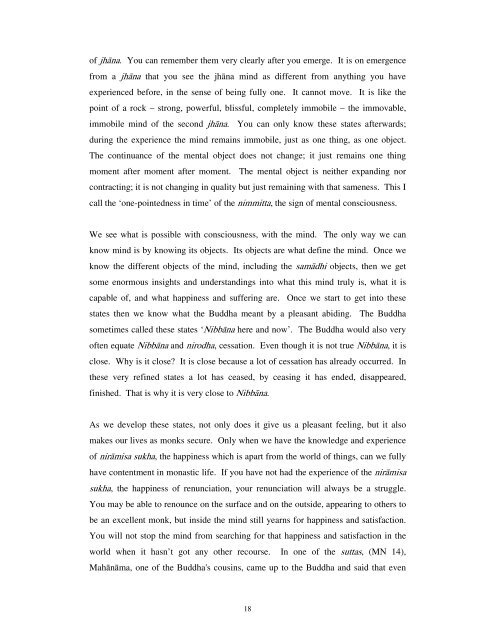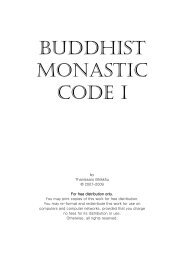- Page 2 and 3: Simply ThisMoment!A COLLECTION OF T
- Page 4 and 5: CONTENTSPage1 Ways and Means into J
- Page 6 and 7: This gives one great insights into
- Page 8 and 9: ūpaloka, even though we are only a
- Page 10 and 11: too much body-awareness. With body-
- Page 12 and 13: and thoughts - apart from the exper
- Page 14 and 15: faculty of the mind to sustain and
- Page 16 and 17: - and this is a natural phenomena -
- Page 20 and 21: though he was a Noble disciple pass
- Page 22 and 23: Anyone who claims the experience of
- Page 24 and 25: Sometimes people have so little con
- Page 26 and 27: the shelf and we know how this whol
- Page 28 and 29: The Delusion of Freedom‘That whic
- Page 30 and 31: monk telling me once that his fathe
- Page 32 and 33: say that in the Anupada Sutta (MN 1
- Page 34 and 35: it’s been still for a long time,
- Page 36 and 37: 3 DETOXIFYING THE MIND2 nd of Febru
- Page 38 and 39: consciousness - or as I would prefe
- Page 40 and 41: is letting go of the pleasures of t
- Page 42 and 43: never overcome thirst in that way.
- Page 44 and 45: Use the triple practice of sãla, s
- Page 46 and 47: after another, hundreds, thousands
- Page 48 and 49: much fire in their minds. This is w
- Page 50 and 51: 4 LOOKING FOR THE SWEET CHILLISeeki
- Page 52 and 53: Listening to fine music. Is this it
- Page 54 and 55: freedom is not freedom at all becau
- Page 56 and 57: We have a story in Buddhism of the
- Page 58 and 59: This is real contentment! This is r
- Page 60 and 61: Watch this inner conversation going
- Page 62 and 63: monastic life does respect the sile
- Page 64 and 65: delusion because it has kept us goi
- Page 66 and 67: This is the opposite of suffering.
- Page 68 and 69:
ight view. It’s very hard for a h
- Page 70 and 71:
always be on the wrong path, and on
- Page 72 and 73:
“Look, if this is causing sufferi
- Page 74 and 75:
out of control. The monastery goes
- Page 76 and 77:
the past and the future, and we’r
- Page 78 and 79:
at all. Who can trust memory? In me
- Page 80 and 81:
can. Give it full attention every m
- Page 82 and 83:
in the morning, afternoon or evenin
- Page 84 and 85:
yourself from all that’s happened
- Page 86 and 87:
mutti is releasing and anālaya is
- Page 88 and 89:
instructions without question.It’
- Page 90:
comes into the mind, then we start
- Page 93 and 94:
hold in the mind’s eye and I was
- Page 95 and 96:
of letting go, not stages of attach
- Page 97 and 98:
Sayutta there is something that imp
- Page 99 and 100:
pushes you out of sasāra whether y
- Page 101 and 102:
7 DHAMMA PRACTICE10 th May 2000I’
- Page 103 and 104:
Adult people look after their own k
- Page 105 and 106:
many people in the world who write
- Page 107 and 108:
What if you make that your goal, an
- Page 109 and 110:
things really complicated. It’s s
- Page 111 and 112:
‘The monks here, or the teacher,
- Page 113 and 114:
and surrender to the path. Surrende
- Page 115 and 116:
8 HUMAN RIGHTS IN BUDDHISMDhammalok
- Page 117 and 118:
doesn’t really have any meaning o
- Page 119 and 120:
These things are not freedoms, they
- Page 121 and 122:
told me in Malaysia and Singapore t
- Page 123 and 124:
When Jerusalem fell in 70AD, becaus
- Page 125 and 126:
To question is a right for people.
- Page 127 and 128:
embarrassed by my fellow Buddhists.
- Page 129 and 130:
many countries between laws which a
- Page 131 and 132:
It’s a very narrow truth. The tru
- Page 133 and 134:
guilty you have to be punished! You
- Page 135 and 136:
the Zendo - but the more you smile
- Page 137 and 138:
Having planed off the rough parts,
- Page 139 and 140:
got the flu and cancelled your appo
- Page 141 and 142:
I was taught to choose to watch the
- Page 143 and 144:
From Diversity to UnityMeditation i
- Page 145 and 146:
usually if someone is dead they wou
- Page 147 and 148:
There are other cases like that. On
- Page 149 and 150:
10 CONDITIONED REALITYDhammaloka Bu
- Page 151 and 152:
The Buddha very clearly outlined th
- Page 153 and 154:
even your bare perception is alread
- Page 155 and 156:
way, there has to be some other exp
- Page 157 and 158:
Seeing Truth and RealityI want part
- Page 159 and 160:
talked with one of the people - who
- Page 161 and 162:
was able to follow to get into deep
- Page 163 and 164:
ideas are not actually the true Nib
- Page 165 and 166:
that the air around it is not movin
- Page 167 and 168:
and find out what that pain really
- Page 169 and 170:
mantras, all words of instructions,
- Page 171 and 172:
just observing. Surely the thinking
- Page 173 and 174:
without valuing, without weighing o
- Page 175 and 176:
so difficult to attain. It is becau
- Page 177 and 178:
12 REFLECTIONS THAT ARE CONDUCIVETO
- Page 179 and 180:
the mind, and that’s the jhānas.
- Page 181 and 182:
need the calm which is developed by
- Page 183 and 184:
can try it with virāga.VirāgaPeop
- Page 185 and 186:
with all of its difficulties and al
- Page 187 and 188:
clinging stops us from experiencing
- Page 189 and 190:
the thirteenth giving up the critic
- Page 191 and 192:
13 THE OUTFLOWINGS OF THE MIND12 th
- Page 193 and 194:
from peace. The will ‘to be’ is
- Page 195 and 196:
the future, to fantasies, to the pa
- Page 197 and 198:
taught here. Going into the present
- Page 199 and 200:
that the core of all this is ‘emp
- Page 201 and 202:
14 STARVING THE TIGER TO DEATHOverc
- Page 203 and 204:
inappropriate for a monk to be doin
- Page 205 and 206:
When a person really understands wh
- Page 207 and 208:
getting angry and upset. This way y
- Page 209 and 210:
You will find simplicity means that
- Page 211 and 212:
use them to make progress in your m
- Page 213 and 214:
By developing seclusion from all th
- Page 215 and 216:
People in the world say everything
- Page 217 and 218:
15 THE LAW OF CONDITIONALITY3 rd Ja
- Page 219 and 220:
elate that sort of smell to a very
- Page 221 and 222:
When you start to see the will ceas
- Page 223 and 224:
up. You see that anger is not the c
- Page 225 and 226:
Wouldn’t it be wonderful to be a
- Page 227 and 228:
Once you can see this whole cause a
- Page 229 and 230:
whether you like it or not. So you
- Page 231 and 232:
anymore than you can break the laws
- Page 233 and 234:
is the barrier of the five hindranc
- Page 235 and 236:
experiences, resting on them, based
- Page 237 and 238:
attention to the sensory world, we
- Page 239 and 240:
Instead of having kāmacchanda we h
- Page 241 and 242:
distraction of ill-will? Outside, w
- Page 243 and 244:
Sloth and TorporSloth and torpor ar
- Page 245 and 246:
wherever you want mind, I’m compl
- Page 247 and 248:
Wherever there’s thinking, it goe
- Page 249 and 250:
17 I KNOW YOU MĀRA25 th August 200
- Page 251 and 252:
“Come on, who do you think you ar
- Page 253 and 254:
you don’t have a clue, that so ma
- Page 255 and 256:
unfolding. In fact, the more you le
- Page 257 and 258:
they’ve got into that habit. What
- Page 259 and 260:
As the Buddha said in the Indriya S
- Page 261 and 262:
about anything because worrying is
- Page 263 and 264:
seeing clearly. Sometimes people ge
- Page 265 and 266:
There is just so much happiness. Th
- Page 267 and 268:
see so much detail. It was always t
- Page 269 and 270:
after us, yet there is this loud mu
- Page 271 and 272:
When you start to see that, it’s
- Page 273 and 274:
this. So if we see where that disco
- Page 275 and 276:
mindfulness, you get pīti, more jo
- Page 277 and 278:
you can meditate, you can teach, be
- Page 279 and 280:
and restlessness cannot survive. Th
- Page 281 and 282:
19 PERFECT STILLNESS29 th June 2005
- Page 283 and 284:
Have You Come Here to Die?At one re
- Page 285 and 286:
At the last retreat I taught in Ipo
- Page 287 and 288:
process is about. You also understa
- Page 289 and 290:
go of everything. Letting go is wha
- Page 291 and 292:
the moment. It doesn’t matter wha
- Page 293 and 294:
moving up and down, the nimmitta is
- Page 295 and 296:
So, look upon your life as a journe
- Page 297 and 298:
Nirodha. Nirodha means cessation, t
- Page 299 and 300:
20 THE ENDING OF EVERYTHING7 th Dec
- Page 301 and 302:
delusion, to think of things as bei
- Page 303 and 304:
samatha and also the word upasama b
- Page 305 and 306:
quoting the suttas here; they are t
- Page 307 and 308:
I was talking earlier this evening
- Page 309 and 310:
opposite is true. The less ‘self
- Page 311 and 312:
senses are. Before that it’s just
- Page 313 and 314:
The mind creates; this is what it d
- Page 315 and 316:
Get into the jhānas, the real jhā
- Page 317 and 318:
whatever things come into existence
- Page 319 and 320:
2. Dukkha - suffering.3. Anattā -
- Page 321 and 322:
Painissagga: “Letting go”, aban






